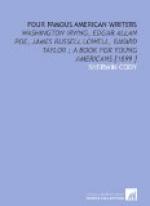He loved his home with a passionate intensity; but he also had yearnings for the unknown world beyond the horizon. “I remember,” says he, “as distinctly as if it were yesterday the first time this passion was gratified. Looking out of the garret window, on a bright May morning, I discovered a row of slats which had been nailed over the shingles for the convenience of the carpenters in roofing the house, and had not been removed. Here was, at least, a chance to reach the comb of the steep roof, and take my first look abroad into the world! Not without some trepidation I ventured out, and was soon seated astride of the sharp ridge. Unknown forests, new fields and houses, appeared to my triumphant view. The prospect, though it did not extend more than four miles in any direction, was boundless. Away in the northwest, glimmering through the trees, was a white object, probably the front of a distant barn; but I shouted to the astonished servant girl, who had just discovered me from the garden below, ’I see the Falls of Niagara!’”
He was a sensitive child and had a horror of dirty hands, “and,” says he, “my first employments—picking stones and weeding corn—were rather a torture to this superfine taste.” In his mother, however, he had a friend who understood and protected him. So his life on the farm was as happy as it well could be, in spite of its roughness. He himself has described it with a zest which no one else could lend it. “Almost every field had its walnut tree, melons were planted among the corn, and the meadow which lay between never exhausted its store of wonders. Besides, there were eggs to hide at Easter; cherries and strawberries in May; fruit all summer; fishing parties by torchlight; lobelia and sumac to be gathered, dried and sold for pocket money; and in the fall, chestnuts, persimmons, wild grapes, cider, and the grand butchering after frost came, so that all the pleasures I knew were incidental to a farmer’s life. The books I read came from the village library, and the task of helping to ‘fodder’ on the dark winter evenings was lightened by the anticipation of sitting down to ‘Gibbon’s Rome’ or ‘Thaddeus of Warsaw’ afterwards.”
He was fond of reading, and especially fond of poetry, and his wife in her biography says: “In the evening after he had gone to bed, his mother would hear him repeating poem after poem to his brother, who slept in the same room with him.”
CHAPTER II
SCHOOL LIFE
Bayard had the advantage of regular attendance at the country schools near his father’s home, with two or three years at the local academy; but his father could not afford to send him to college. He enjoyed his school life, and in after years wrote to one of his early Quaker teachers thus:
“I have never forgotten the days I spent in the little log schoolhouse and the chestnut grove behind it, and I have always thought that some of the poetry I then copied from thy manuscript books has kept an influence over all my life since. There was one verse in particular which has cheered and encouraged me a thousand times when prospects seemed rather gloomy. It ran thus:




